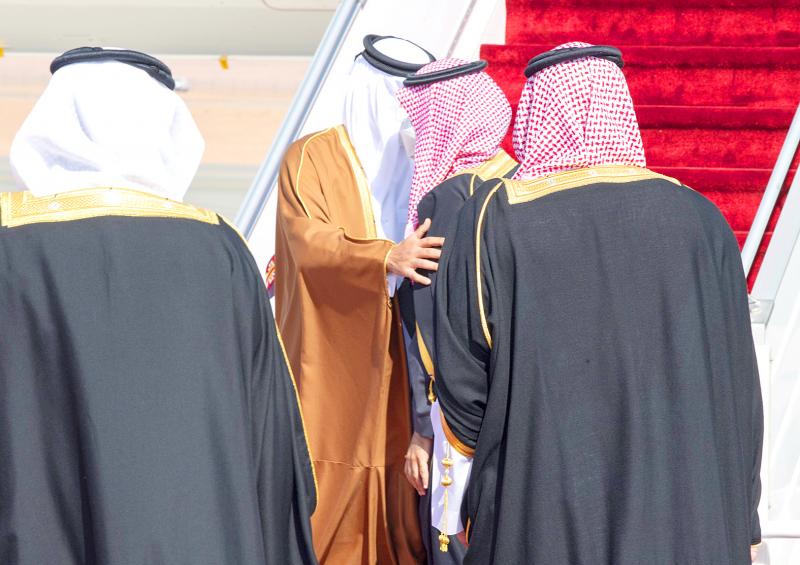Qatar’s ruler yesterday arrived in Saudi Arabia and was greeted with an embrace by its crown prince, following an announcement that the kingdom would end its embargo on the tiny Persian Gulf state.
The decision to open borders was the first major step toward ending the diplomatic crisis that has deeply divided US defense partners, frayed societal ties and torn apart a traditionally clubby alliance of Arab states.
The arrival of Qatari Emir Sheikh Tamim bin Hamad Al Thani in the kingdom’s ancient desert city of Al-Ula was broadcast live on Saudi TV. He was seen disembarking from his plane and being greeted with a hug by Saudi Arabian Crown Prince Mohammad bin Salman, though both wore masks due to COVID-19 precautions.

Photo: EPA-EFE
The emir is in Al-Ula for an annual summit of Gulf Arab leaders that is expected to produce a detente between Qatar and four Arab states that have boycotted the country, and cut transport and diplomatic links with it since 2017 over Doha’s support for Islamist groups and warm ties with Iran.
The diplomatic breakthrough comes after a final push by outgoing US President Donald Trump’s administration and fellow Gulf state Kuwait to mediate an end to the crisis. It was not until late Monday that the decision to end the spat was announced.
The timing was auspicious: Saudi Arabia might be seeking to both grant the Trump administration a final diplomatic win and remove stumbling blocs to building warm ties with US president-elect Joe Biden’s administration, which is expected to take a firmer stance toward the kingdom.
It was unclear what, if any, significant concessions Qatar had made toward shifting its policies. The boycott largely failed to change Doha’s regional posture, instead buoying Sheikh Tamim domestically as patriotic fervor swept through Qatar in support of his resolve.
The boycott also pushed Qatar closer to Saudi Arabia’s rivals Turkey and Iran, which rushed to support the Gulf state when it faced shortages in medical and food supplies in the first days of the embrago.
Qatar’s only land border, which it relied on for the import of dairy products, construction materials and other goods from Saudi Arabia, has been mostly closed since June 2017, when the kingdom, Egypt, the United Arab Emirates (UAE) and Bahrain launched their boycott.
While Riyadh’s decision to open its airspace, land and sea borders with Qatar marks a milestone toward resolving the dispute, the path toward full reconciliation is far from guaranteed. The rift between Abu Dhabi and Doha has been deepest, with the UAE and Qatar at sharp ideological odds.
UAE Minister of State for Foreign Affairs Anwar Gargash wrote on Twitter late on Monday that his country was keen to restore Gulf unity, but cautioned: “We have more work to do.”
The summit is expected to see some form of detente between Qatar and the UAE, Egypt and Bahrain, in addition to a signing ceremony with Saudi Arabia.

‘ABUSE OF POWER’: Lee Chun-yi allegedly used a Control Yuan vehicle to transport his dog to a pet grooming salon and take his wife to restaurants, media reports said Control Yuan Secretary-General Lee Chun-yi (李俊俋) resigned on Sunday night, admitting that he had misused a government vehicle, as reported by the media. Control Yuan Vice President Lee Hung-chun (李鴻鈞) yesterday apologized to the public over the issue. The watchdog body would follow up on similar accusations made by the Chinese Nationalist Party (KMT) and would investigate the alleged misuse of government vehicles by three other Control Yuan members: Su Li-chiung (蘇麗瓊), Lin Yu-jung (林郁容) and Wang Jung-chang (王榮璋), Lee Hung-chun said. Lee Chun-yi in a statement apologized for using a Control Yuan vehicle to transport his dog to a

Taiwan yesterday denied Chinese allegations that its military was behind a cyberattack on a technology company in Guangzhou, after city authorities issued warrants for 20 suspects. The Guangzhou Municipal Public Security Bureau earlier yesterday issued warrants for 20 people it identified as members of the Information, Communications and Electronic Force Command (ICEFCOM). The bureau alleged they were behind a May 20 cyberattack targeting the backend system of a self-service facility at the company. “ICEFCOM, under Taiwan’s ruling Democratic Progressive Party, directed the illegal attack,” the warrant says. The bureau placed a bounty of 10,000 yuan (US$1,392) on each of the 20 people named in

The High Court yesterday found a New Taipei City woman guilty of charges related to helping Beijing secure surrender agreements from military service members. Lee Huei-hsin (李慧馨) was sentenced to six years and eight months in prison for breaching the National Security Act (國家安全法), making illegal compacts with government employees and bribery, the court said. The verdict is final. Lee, the manager of a temple in the city’s Lujhou District (蘆洲), was accused of arranging for eight service members to make surrender pledges to the Chinese People’s Liberation Army in exchange for money, the court said. The pledges, which required them to provide identification

INDO-PACIFIC REGION: Royal Navy ships exercise the right of freedom of navigation, including in the Taiwan Strait and South China Sea, the UK’s Tony Radakin told a summit Freedom of navigation in the Indo-Pacific region is as important as it is in the English Channel, British Chief of the Defence Staff Admiral Tony Radakin said at a summit in Singapore on Saturday. The remark came as the British Royal Navy’s flagship aircraft carrier, the HMS Prince of Wales, is on an eight-month deployment to the Indo-Pacific region as head of an international carrier strike group. “Upholding the UN Convention on the Law of the Sea, and with it, the principles of the freedom of navigation, in this part of the world matters to us just as it matters in the